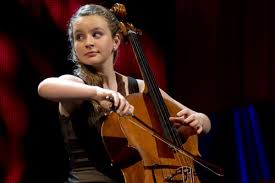Mote Hall, Maidstone, 28 November 2016
A highly demanding programme for the orchestra and one not without its challenges for the audience. Brian Wright brought together four late romantic works which complemented each other with their respective approaches to narrative. All four take us on a journey, some more overtly picturesque than others, but nothing that could be called abstract.
Richard Strauss’ Don Juan is a case in point. It may not follow Byron in any literal sense but the episodes and emotional turmoil of the Don’s life are clearly displayed for us. If the strings seemed a little thin at the start they soon gained courage and by the end brought us the lush richness Strauss requires. There was some splendid playing from the horn section, and throughout the sense of pace and tone colour was finely etched.
It was a real pleasure to welcome back Laura van der Heijden as soloist in Walton’s Cello Concerto. It was with this work she won the BBC Young Musician of the Year in 2012, and in the intervening years her approach has deepened and gained an even more captivating warmth. Where Walton’s orchestral writing can be quirky and strident, the solo line is always approachable. She brought a joyous spontaneity to the second movement and led us through the more introvert solo passages of the final movement with ease and conviction. It was a privilege to hear her again. Maybe there are plans for another of the great cello concerti in future?
Albert Roussel is hardly a household name but the suite from his ballet The Spider’s Banquet is more than just a charming rarity. The writing sits comfortably between Debussy’s romantic web-spinning and the intensity of early Stravinsky. I don’t think it is taking things too far to suggest that Roussel has passages that are remarkably like The Rite of Spring in their insistent rhythms and attack. Of course, unlike the Stravinsky, they do not last but they are certainly there. Brian Wright drew our attention to these even as we easily followed the story of the ballet itself, and the life and death of the insects.
In The South is Elgar at his most extrovert and the concert overture sits well beside Strauss’ Don Juan. There is little of English melancholy here and a great deal of extravagant rushing about. There are many passages that look towards the scherzo of the Second Symphony in the frenetic energy which is required from the players and listeners. Yet at the heart of the work is the melting viola solo – wonderfully played by David Hesketh – which could only be by Elgar.
A splendid evening – would that there had been even more there to enjoy it.
The next concert on 30 January brings us Nielsen, Mozart and Dvorak.

